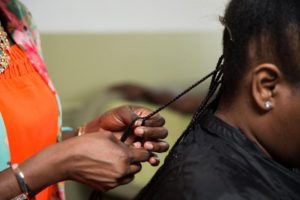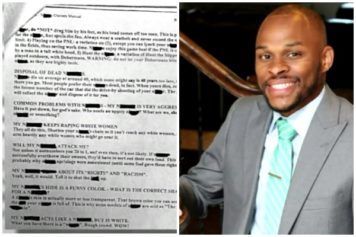
Hair braider Fatou Diouf pays $830 to the state each month to cover fines imposed by the state’s cosmetology board. (Image courtesy of the Institute for Justice)
Natural hair braiders are free to work without a license in nearly half the country, but down in Tennessee, stylists still face hefty fines simply for plaiting hair.
Since 2009, the Tennessee Board of Cosmetology and Barber Examiners has levied almost $100,000 in fines against dozens of braiders and 30 natural hair salons across the state, a recent investigation by the Institute for Justice found. All the violations were for unlicensed braiding — NOT sanitation or health offenses.
According to the institute, the Board will typically issue a $1,000 civil penalty for every instance of “…performing natural hair care services for clients without a license” it sees. Unlicensed braiders and stylists who work out of their homes aren’t the only ones being forced to pay up, however. The Board has also targeted licensed salons like the one run by local woman Fatou Diouf, who’s been braiding hair for almost two decades.
In recent years, Diouf said she’s been forced to pay an astounding $16,000 in fines for employing workers who didn’t have a government license to braid hair. The heavy fines have been especially stressful for the veteran braider, who’s struggling to raise two kids, deal with her divorce and send money back home to family in her native Senegal.
Diouf is currently on a payment plan for her most recent offenses, shelling out nearly $830 a month to the state, according to Forbes.
Braiders in other states have faced similar fines in the past. Last year, Indiana became the 22nd state to exempt natural and African–style hair braiding from the state’s cosmetology laws, thanks to a much—needed bill. Before then, however, braiders were forced to either abandon their craft or shell out $20,000 in beauty school tuition to complete the mandated 1,500 hours of training. Those caught practicing without a license risked a misdemeanor, a crime carrying maximum $500 fine.
Tennessee requires at least 300 hours of coursework, and beauty school tuition can range anywhere from $1,500 to $5,000. Diouf called the mandated classed as “mostly a waste of my time.”
“We don’t need 300 hours to know how to wash a clip or a comb,” she said.
Diouf has since become a vocal voice in the call for reform and recently teamed up with the Institute for Justice and Beacon Center to testify in favor of a bill that would ax the state’s license requirement for hair braiders.
“We can create more employment if this bill passes,” she said.


